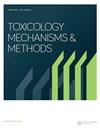Protective effect of Fragaria ananassa methanolic extract on cadmium chloride (CdCl2)-induced hepatotoxicity in rats
IF 2.8
4区 医学
Q2 TOXICOLOGY
引用次数: 28
Abstract
Abstract This study investigated the protective effect of Fragaria ananassa methanolic extract on cadmium chloride (CdCl2)-induced hepatotoxicity in rats. CdCl2 was intraperitoneally injected at a dose of 6.5 mg/kg of body weight for 5 d with or without methanol extract of Fragaria ananassa (250 mg/kg). The hepatic cadmium concentration, lipid peroxidation, nitric oxide, glutathione (GSH) content, and antioxidant enzyme activities, including superoxide dismutase, catalase (CAT), GSH peroxidase, and GSH reductase, were estimated. CdCl2 injection induced a significant elevation in cadmium concentration, lipid peroxidation, and nitric oxide and caused a significant depletion in GSH content compared to controls, along with a remarkable decrease in antioxidant enzymes. Oxidative stress induction and cadmium accumulation in the liver were successfully ameliorated by F. ananassa (strawberry) pre-administration. In addition, the pre-administration of strawberry decreased the elevated gene expression of the pro-apoptotic Bax gene as well as the protein expression of caspases-3 in the liver of CdCl2-injected rats. In addition, the reduced gene expression of anti-apoptotic Bcl-2 was increased. Our results show an increase in the expression of tumor necrosis factor α in the liver of rats treated with cadmium. In sum, our results suggested that F. ananassa successfully prevented deleterious effects on liver function by reinforcing the antioxidant defense system, inhibiting oxidative stress and reducing apoptosis.香甲醇提取物对氯化镉(CdCl2)所致大鼠肝毒性的保护作用
摘要:本研究探讨了菝葜甲醇提取物对氯化镉(CdCl2)致大鼠肝毒性的保护作用。以6.5 mg/kg体重的剂量腹腔注射CdCl2,加或不加花菜甲醇提取物(250 mg/kg),连续5 d。测定肝脏镉浓度、脂质过氧化、一氧化氮、谷胱甘肽(GSH)含量和抗氧化酶活性,包括超氧化物歧化酶、过氧化氢酶(CAT)、谷胱甘肽过氧化物酶和谷胱甘肽还原酶。与对照组相比,注射CdCl2导致镉浓度、脂质过氧化和一氧化氮显著升高,GSH含量显著降低,抗氧化酶显著降低。草莓预给药可有效改善氧化应激诱导和镉在肝脏中的积累。此外,草莓预给药降低了cdcl2注射大鼠肝脏中促凋亡基因Bax的升高基因表达和caspase -3的蛋白表达。此外,抗凋亡基因Bcl-2的表达水平降低。结果表明,镉处理大鼠肝脏中肿瘤坏死因子α的表达增加。综上所述,我们的研究结果表明,凤仙花通过增强抗氧化防御系统,抑制氧化应激和减少细胞凋亡,成功地预防了对肝功能的有害影响。
本文章由计算机程序翻译,如有差异,请以英文原文为准。
求助全文
约1分钟内获得全文
求助全文
来源期刊

Toxicology Mechanisms and Methods
TOXICOLOGY-
自引率
3.10%
发文量
66
期刊介绍:
Toxicology Mechanisms and Methods is a peer-reviewed journal whose aim is twofold. Firstly, the journal contains original research on subjects dealing with the mechanisms by which foreign chemicals cause toxic tissue injury. Chemical substances of interest include industrial compounds, environmental pollutants, hazardous wastes, drugs, pesticides, and chemical warfare agents. The scope of the journal spans from molecular and cellular mechanisms of action to the consideration of mechanistic evidence in establishing regulatory policy.
Secondly, the journal addresses aspects of the development, validation, and application of new and existing laboratory methods, techniques, and equipment. A variety of research methods are discussed, including:
In vivo studies with standard and alternative species
In vitro studies and alternative methodologies
Molecular, biochemical, and cellular techniques
Pharmacokinetics and pharmacodynamics
Mathematical modeling and computer programs
Forensic analyses
Risk assessment
Data collection and analysis.
 求助内容:
求助内容: 应助结果提醒方式:
应助结果提醒方式:


